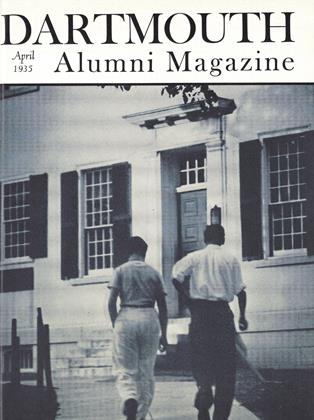What he deplored was that the teams were given no money for transportation. For this, they had to depend on the guarantees from the opponents, and the contributions of the athletes in the way of cars and running expenses for the cars. And that is a lamentable condition; for the athletes arrived to play games completely fatigued by the tiresome trip and the cramped quarters in the automobiles.
The remedial changes that I should like to advocate are neither original nor anomalous; they have been adopted by Williams College and Cornell University, both up against the same problem that we have at Dartmouth.
The Williams plan is briefly, this: Upon matriculation the student shall pay a sum of fifteen dollars for hospital attention and medical care. For this amount he will receive medical care throughout his four years of college. If it is necessary that he be confined to the hospital, he will be allowed one week there and he will have no bills to pay. And in the event that he must remain longer, his only bills will be for board. Doctor's bills will be covered by the student's original fifteen-dollar outlay.
This is a palpably different situation from what exists at Dartmouth. The majority of students fear confinement at Dick's House because of the extortionate charges made for treatment and board there. A week's confinement amounts to thirty-five dollars for board alone, and when the doctors' fees have been added to the bill, it is a staggering addition. There would undoubtedly be less sickness here if students could go to the hospital when they should without having the constant worry as to how the bill will be paid. I mention the Williams plan in connection with the minor sports situation because of the drain on the exchequer of the Athletic Council in paying the exorbitant bills sent by Dick's House for the care of injured athletes.
Cornell is in the same predicament as Dartmouth, and in March of this year the Cornell Athletic Council decided that students should pay ten (or perhaps it was twenty) dollars to aid in the support of athletics. The question which arose was: Should minor sports t; abolished, or should schedules be curtailed? It was decided that schedules should be kept as long as possible, and in order to do this, it was found that football support was not enough, and that students should add to the athletic funds by this comparatively small contribution at matriculation.
The logical conclusion to draw from these plans, is that not one, but both should be adopted. By an assessment of about twenty-five dollars on the student entering college, both plans might be applied, and with the addition of this system to the present one which involves utter dependence on the gate receipts from football games, the Council might be able to function without its annual deficit. Every student must spend some time in athletics, either in intramurals or athletic squads. The sum of twenty-five dollars does not seem exorbitant when one considers the benefits that would come to the student for this tax. For scholarship men who could not afford to pay that amount, the tax could be reduced to onehalf or one-third. That is the plan, and it is offered with the hope that if not this, at least something will be done to put minor sports in a position where they can be enjoyed, actually enjoyed, by the men participating in them.
 View Full Issue
View Full Issue
More From This Issue
-
 Article
ArticleHANOVER BROWSING
April 1935 By Herbert F. West '22 -
 Article
ArticleSTABILIZATION BY SPECIE PAYMENTS
April 1935 By Edward Tuck '62 -
 Class Notes
Class NotesClass of 1908
April 1935 By L. W. Griswold -
 Class Notes
Class NotesClass of 1910
April 1935 By Harold P. Hinman -
 Class Notes
Class NotesClass of 1918
April 1935 By Allan C. Gottschaldt -
 Class Notes
Class NotesClass of 1929
April 1935 By F. William Andres
Article
-
 Article
ArticleBaltzell Estate
April 1940 -
 Article
ArticleThe Robert C. Strong Memorial Crafts
December 1960 -
 Article
ArticleA Wah Hoo Wah for –
OCTOBER 1964 -
 Article
ArticleThe Dean Hopes for Sober Places
APRIL 1996 By "E. WHEELOCK" -
 Article
ArticleDartmouth Names on the Moon
MARCH 1971 By ALLEN L. KING -
 Article
ArticleMedical School
JANUARY 1964 By HARRY W. SAVAGE M' 27

